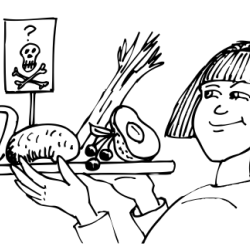Source Institutions
Source Institutions
Add to list Go to activity
Activity link broken? See if it's at the internet archive

This reading and writing activity (on pages 2-9) teaches what plant parts should be avoided, how a person can get rid of toxins, symptoms of plant poisoning, and how plants create poisons to repel predators. Excerpts from a video and biography of Fatima Johnson, an anthropologist who studies plants and people in Africa, are available online, and the full versions can be purchased on DVD. An interactive version of the activity, and tips for using this resource, are also online.
- 10 to 30 minutes
- 30 to 45 minutes
- $1 - $5 per group of students
- Ages 8 - 14
- Activity
- English, Spanish
Quick Guide
Materials List (per group of students)
- pencils or colored markers
- cookbooks from home or school library that include recipes for potatoes, apples, lima beans, rhubarb, cherries, cassava (tapioca), avocado, and one that contains the spice nutmeg
- 8 copies of Poison Plant Recipe Card (on page 6) for each group
Subjects
-
Life Sciences
-
Diversity of Life
- Plants
-
Ecology
- Ecosystems
-
Diversity of Life
-
The Nature of Science
-
The Scientific Process
- About Inquiry
- Asking Questions
-
The Scientific Process
Informal Categories
- Food and Cooking
- Gardening
Audience
To use this activity, learners need to:
- see
- read
Learning styles supported:
- Involves teamwork and communication skills
- Links STEM to other topics of interest such as arts and humanities
- Uses STEM to solve real-world problems
Designed specifically for
- Rural dweller
Culture, ethnicity, and gender
-
African American
- Identifies role models or mentors in STEM fields from this group
- Uses inclusive images of people from this group
-
Girls
- Explicity developed for this group
- Identifies role models or mentors in STEM fields from this group
- Uses inclusive images of people from this group
Other
Foreign language versions of this resource:
Components that are part of this resource:
- Fatimah Jackson video excerpt
- Poisons for Dinner??? interactive
- How to Use Wonderwise
- African Plant Explorer Community Service Ideas
Includes alignment to state and/or national standards:
This resource is part of:
Access Rights:
- Free access
By:
Source Collection
- Science After School Consumer's Guide
Rights:
- All rights reserved, University of Nebraska State Museum, 2001
Funding Sources:
- Howard Hughes Medical Institute
- NSF Informal Science Education Program, 9909496
